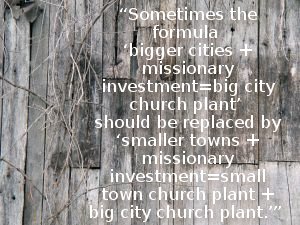The Gospel and Multiethnicity

Among those alive in 1989, who can forget the images of the fall of the Berlin Wall? It was one of those moments in life that make an indelible impression on many so that they remember where they were and what they were doing when it occurred. My family and I were living in France as the television broadcast live images of people scrambling over the wall and throngs of people standing on the wall singing while others with sledgehammers chipped away at the stark, ugly edifice which had separated the German people for decades. We recall President Reagan’s earlier words to Soviet leader Mikhail Gorbachev—“Mr. Gorbachev, tear down this wall!” A country that had been torn for decades was soon reunited.
That historic event may serve as a pale and imperfect analogy to what Christ accomplished at the cross when by His death, when through His blood, He brought peace to former enemies—Jews and Gentiles—by removing what the Apostle Paul in Ephesians 2:14 calls the “dividing wall of hostility,” and by “killing the hostility” (v. 16). Christ inaugurated a new state of being and a new way of living which is a model for believers today in our quest to experience and express the reality of being part of the new people of God.
Grace Church of Philadelphia is committed to “multi” in many ways—multi-generational, multi-socioeconomic and multi-ethnic ministry. Because we have a multi-ethnic missional objective, we want to be intentional in healing divisions and in celebrating God-given diversity. Our desire is that Grace Church reflect the diversity of our urban community and the diversity which exists in the body of Christ—not because it’s a great idea, although it is; not because we have overcome bigotry and eradicated all traces of prejudice from our hearts, because we haven’t; not because it will be easy, because it won’t be; but because there is a biblical basis for this commitment, because multi-ethnic diversity is God’s idea.
 Few people have ever captured and caricatured all levels of American society more successfully than did cartoonist Al Capp in his classic comic strip “Li’l Abner.” Arguably, the funniest sequences in the series are those where Abner, Mammy, or other members of the Yokum clan venture from their home in Dogpatch into the big city. There they interact with the urbanites, and hilarity ensues. For all of their sophistication and culture, the socialites can never seem to get the best of the hillbillies from the Ozarks.
Few people have ever captured and caricatured all levels of American society more successfully than did cartoonist Al Capp in his classic comic strip “Li’l Abner.” Arguably, the funniest sequences in the series are those where Abner, Mammy, or other members of the Yokum clan venture from their home in Dogpatch into the big city. There they interact with the urbanites, and hilarity ensues. For all of their sophistication and culture, the socialites can never seem to get the best of the hillbillies from the Ozarks. Read
Read  Demetrius, a fellow worker for the truth, to Georgias, whom I love in truth.
Demetrius, a fellow worker for the truth, to Georgias, whom I love in truth.



Discussion